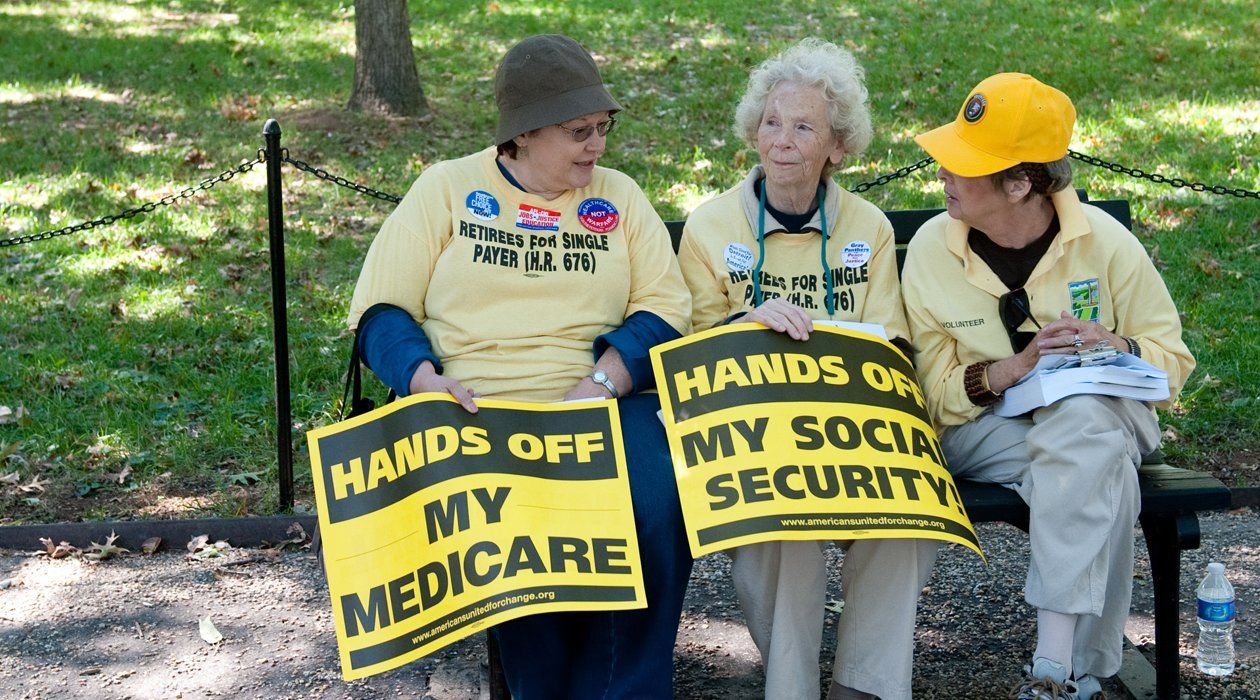
America's budget problem boils down to a simple question: how much will we let programs for the elderly displace other government functions—national defense, education, transportation and many others—and raise taxes to levels that would, almost certainly, reduce economic growth? What's depressing is that this question has been obvious for decades, but our political leaders have consistently evaded it. This includes and indicts Democrats, Republicans, conservatives, liberals and every president since Jimmy Carter, particularly Bill Clinton and George W. Bush, who clearly understood the problem.
Our political culture prefers delusion to candor. Liberals would solve the budget problem by taxing the rich and cutting defense. Think again. The richest 5 percent already pay about 45 percent of federal taxes; they may pay more but not enough to balance the budget. Defense spending constitutes a fifth of federal spending; projected deficits over the next decade are similar. We won't shut the Pentagon. Republicans and Tea Partyers think that eliminating "wasteful spending" would allow more tax cuts. Dream on. The major spending programs, Social Security and Medicare, are wildly popular with roughly 50 million beneficiaries.
Now come Erskine Bowles and Alan Simpson, co-chairmen of the National Commission on Fiscal Responsibility and Reform, with a plan. It would freeze government salaries for three years, increase the gasoline tax by 15 cents a gallon, and slowly raise Social Security's eligibility ages for early retirement and full benefits. These ages are now 62 and 66; they would go to 64 and 69 around 2075. Sensibly, changes wouldn't start until 2012 to avoid threatening the economic recovery.
Unfortunately, the plan has much wishful thinking. It would cap federal spending at 22 percent of the economy (gross domestic product) and taxes at 21 percent of GDP. These targets represent modest increases over averages for 1970 to 2009: 20.7 percent of GDP for spending; 18.1 percent for taxes. But maintaining the targets assumes that health-care costs - the largest factor expanding spending - slow significantly. Bowles-Simpson has few proposals to make that happen.
We need something more powerful: budget changes that redefine government to reflect today's social and economic realities. Longer life expectancies justify raising eligibility ages for Social Security faster than Bowles-Simpson suggests. Wealthier retirees should pay more for Medicare. Somehow we need to control health spending. We should eliminate programs that are ineffective or serve narrow interests: farm subsidies, Amtrak and others.
To understand our predicament, glance at the table below. It shows federal taxes and spending as a share of GDP for 2006 (the last "normal" year before the slump) and projections for 2020 and 2035. The Social Security, Medicare and Medicaid forecasts - reflecting current benefits - come from the Congressional Budget Office. Other spending categories are held constant as a share of GDP. There's no room for big emergencies or new programs. Though crude, the resulting numbers capture the mounting pressures.
The federal budget as share of GDP
| 2006 | 2020 | 2035 | |
| Spending | 20.1 | 24.2 | 28.9 |
| Social Security Medicare,Medicaid | 8.3 | 12.4 | 17.1 |
| Defense | 3.9 | 3.9 | 3.9 |
| Other spending | 6.2 | 6.2 | 6.2 |
| Net interest | 1.7 | 1.7 | 1.7 |
| Taxes | 18.2 | ? | ? |
| Deficit | 1.9 | ? | ? |
It's scary. From 2006 to 2035, federal spending goes from 20 percent of GDP to almost 29 percent. Social Security, Medicare and Medicaid (including Obamacare) account for all the increase. The reasons: More elderly people and climbing health costs. In 2035, the 65-plus population will be 93 percent larger than in 2010. Paying for bigger government would require a tax increase of about 50 percent. If we want to avoid a tax increase - while honoring existing Social Security and health-care benefits - we'd have to cut all other programs by about 80 percent. (And these figures are probably optimistic, because interest on government debt is assumed to remain low.)
The problem is not reducing the deficit. It is controlling spending in a way that seems socially just, economically sensible and politically tolerable. If we are honest - neither party has been - it means asking how much we allow benefits for the old to burden the young through higher taxes, lower public services, slower economic growth and weakened national security.
Any genuine debate must be wrenching because government has promised more than it can realistically deliver, and lower benefits or higher taxes will leave many feeling (justifiably) mistreated. No one would be happy. Liberals would have to accept sizable benefit cuts; conservatives, tax increases.
Recognizing this logic, America's leaders have averted their eyes and held their tongues. President Obama continues this inglorious avoidance. His Obamacare actually made matters worse by increasing the least controllable spending. The initial reception to Bowles-Simpson has been predictably tepid. But even if it passed Congress, it would be only a first step.
Uncommon Knowledge
Newsweek is committed to challenging conventional wisdom and finding connections in the search for common ground.
Newsweek is committed to challenging conventional wisdom and finding connections in the search for common ground.
About the writer
To read how Newsweek uses AI as a newsroom tool, Click here.








